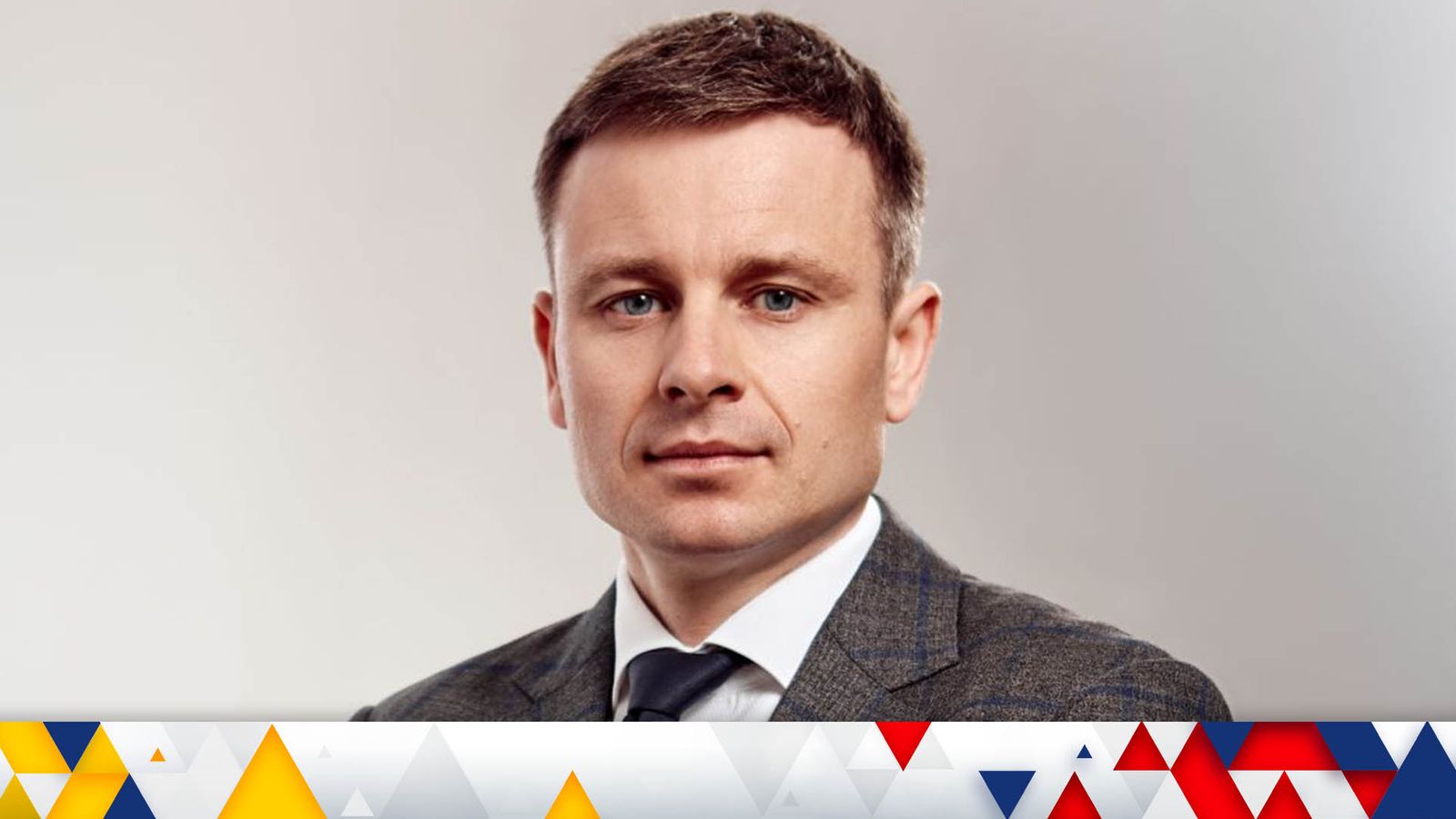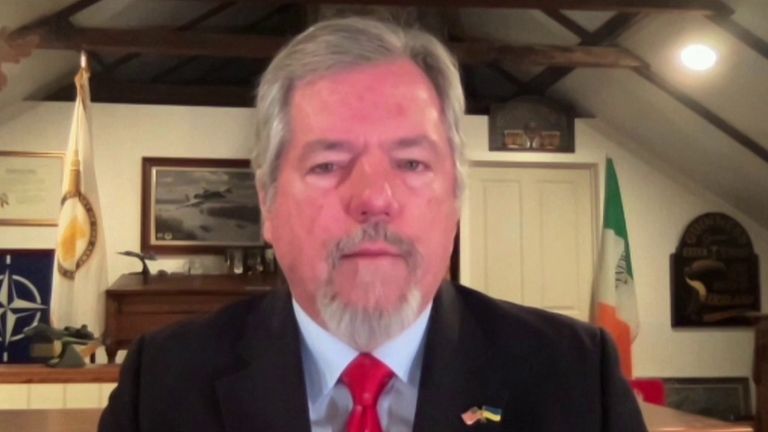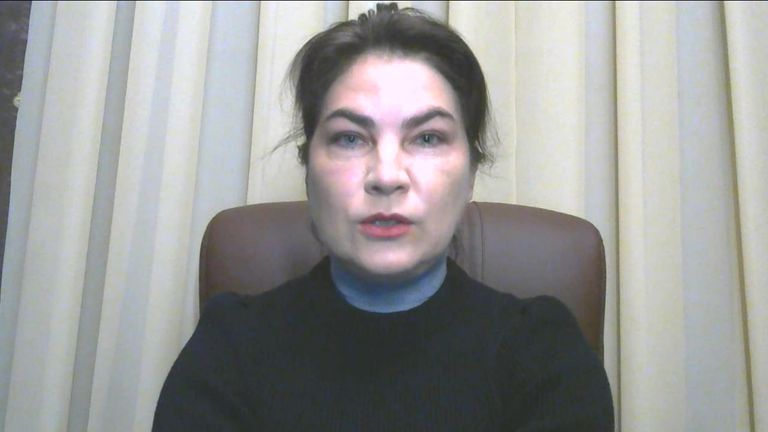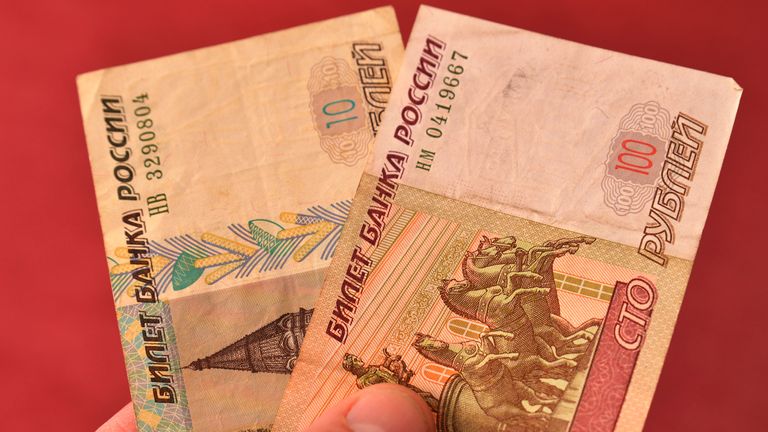Ukraine’s finance minister has told Sky News that Russia should be made to pay post-war reparations to his country once the conflict between the two has ended.
In an exclusive interview, Sergii Marchenko said there was an expectation among Ukrainians that Russia should pay for its aggression, highlighting a variety of ways in which money could be raised from Moscow.
He told Ian King Live: “It’s not just only frozen assets of banks of Russia, it’s frozen assets from business oligarchs from Russia, it’s… other taxes, additional taxes on Russia, oil and gas which can be directed towards Ukraine or more reparations, because of their decisions they should pay for that.
“Doing war in Ukraine is their decision – so that’s why they should pay for the decision after the war.”
Get the latest live updates on the war in Ukraine
Mr Marchenko said that he hoped the global community would be able to enforce reparations from Russia based on international judicial processes and that the “necessary amount” could be raised to support Ukrainian reconstruction.
The EU has already promised to set up a post-war reconstruction fund to rebuild Ukraine’s battered infrastructure and Mateusz Morawiecki, the Polish prime minister, has suggested this should contain at least €100bn (£83.5bn) worth of funds.
A modern ‘Marshall Plan’ to rebuild Ukraine
However, Mr Marchenko said the ultimate bill for reconstruction could end up being considerably more than that, with the likely total running into hundreds of billions of dollars.
He added: “Just our infrastructure, critical infrastructure, costs us $120bn (£92.1bn) which was damaged by war and, if you add social and military infrastructure, it could be more than $500bn.”
Mr Marchenko, who was educated both in Ukraine and at the prestigious John F Kennedy School of Government at Harvard University, said he was attracted to the idea of a reconstruction package along the lines of the Marshall Plan – the giant support package under which the United States offered financial aid to a number of countries in Europe after the Second World War.
He went on: “Yes, it is possible… we should create such a fund or vehicle how to support Ukraine and make sure it was [based on the] experience of post war Europe, how they reconstructed, how they created [the necessary conditions to] build their economy – it should be something like a Marshall Plan for Ukraine.
“It could be possible to start this plan just after the war.”
‘Our debt, our growing deficit, is very huge right now’
The vehicle, he suggested, could be based on the United 24 (U24) alliance that Volodymyr Zelenskyy, the Ukrainian president, outlined in a speech last month to US Congress. The body would not only work together to stop conflicts using sanctions, humanitarian support and money but would also support those who have experienced humanitarian crises due to war or natural disasters
Mr Marchenko, who was speaking a day after the World Bank forecast that Ukraine’s economy could shrink by 45% this year, described some of the stresses being faced by the country’s public finances. He said tax receipts had collapsed while Kyiv was having to spend vast sums on the war effort but said that, to date, public sector workers and state pensions had continued to be paid.
Apart from humanitarian and economic assistance from the UK, the EU and the US, Ukraine has also been able to raise money by issuing war bonds and has already raised more than $1bn in five auctions.
But he warned: “Of course our debt, our growing deficit, is very huge right now and we are looking at different ways how to finance it, especially negotiations with donor countries, international and financial organisations. We are expecting that we will find the necessary tools to finance our budget deficit.”
Mr Marchenko, a 41-year old father of two who has completed two Ironman challenges, also urged European countries to wean themselves off Russian oil and gas as quickly as possible.
He said: “Sanctions are not enough and we need much more because we are still in a war with Russia and, to win this war, we should have additional pressure on them.
“If they receive dollars to support their military it means that they [will continue to] be in Ukraine – so that’s why an embargo on oil and gas from Russia will be a next step and we are eager for this sanction from the EU and other countries.”
Some European countries, such as Estonia, Latvia and Lithuania, have already imposed a blanket ban on Russian oil and gas imports while others, such as Poland and the UK, have said they will have stopped buying hydrocarbons from Moscow by the end of the year.
But others, including Germany, Italy and Austria, have insisted that they could not cut off Russian oil and gas without triggering recessions in their own countries.
Asked what his message would be to such countries, Mr Marchenko replied: “Please look at Ukraine in this particular moment in time – the Russians kill our people, destroy our infrastructure, destroy our economy…it’s our people who are killed and that’s why your decision [is important ] – it’s a question of how many people [you] will be able to save.
He said a modest recession in some parts of Europe was a small price to pay if it brought Russia’s aggression to an end.




